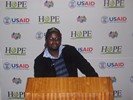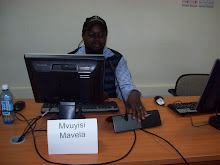Friday, September 26, 2008
Are we studying for huge salary or to plough back to our communities?
The reason for the above heading is, I am provoked by fact that our youth have moved away from the basic foundation of being educated in order to plough back to our communities. They simple study to enrich themselves through getting that job which will pay them big salaries so they can be semi royalties and neglect their parents under their newly created idiom “Ayincanci etholeni”, meaning “a cow can not breastfeed from its own calf”.
Have we lost the “Spirit of Ubuntu” or are we playing stupid? Remember, the Holy Bible “Honour your father and your mother, so that you may live long in the land the LORD your God is giving you” [Exodus 20:12] and also Quran "'Do not worship except Allah; and to parents, do good…'" [Quran 2:83].
In our country South Africa, our youth potential to upgrade the living style of each other is contaminated by high organised crime rate and the absentee of graduates as role model has yardstick them to believe criminals are role model of our societies.
If we as graduate are failing dismally to rescue our society from crime and other social challenging issues then we have lost our primary reason why our parents have been cautiously raising us for. If we as society are failing to address these issues, then big fat salaries are being demonised in our society. Quoting Councillor Mike Whetton “Residents will see measures that they themselves have identified as priorities to reduce crime and the fear of crime.
Our highly paid graduates are migrating from location to suburbs and displaying their haves through drinking expensive whiskey and driving C class cars. If one tries to engage them to social developmental structures they simple denounce your suggestion under the good name of Youth Commission’s duty to modernize our communities.
I appeal to all graduate to be involved in our community development projects and to offer skills whenever is dim necessary. We supposed to be Ambassadors of our institutions which are community based institutions.
There’s totally nothing wrong to be harboured at suburbs and be pocket filled with big fat salary. We need to administer ourselves with dignity and to freely contribute towards the development projects. We must be role models of our younger brothers and sister; and not display liquor as if is a Olympics medals for being educated.
I challenge every graduate to be a true Ambassador of Development in our society.
HOPE/e-Learning Outreach Project
The e-Learning Development and Support Unit (EDSU), of the University of the Western Cape is committed to become a leader and producer of knowledge in the community through the innovative and effective application of information and communication technologies, systems and services (ICTS).
The problem arose from the fact that the fieldworkers have access to computers but they lack skills on how to utilize basic computer programmes, e.g. Microsoft word, Excel, etc. HOPE Worldwide Manager Mrs. Joan Daries approached one of her Internship student from UWC Mrs. Nelisiwe Maleka (Masters in Admin.) to device means of capacitating the fieldworkers with relevant basic computer literacy training so that they can have the skills and basic knowledge to use computer programmes in their day to day office duties.
Mrs. Maleka appraoched Mr. Ncedikhaya Magopeni (Manager: VICE-RECTOR: STUDENT AFFAIRS) to assists them. He then refer it to eLearning Development, Support Unit (EDSU) Manager Mrs. Juliet Stoltenkamp who gladly agreed to assists them and proper arrangement were formulated to meet the needs of fieldworkers. Mr. Mavela (eLearning Student Support coordinator) was selected to administer and facilitate this project.
The project took place at Thintana lab every saturday for 12 weeks with some class exercises and tests between.
Lesson covered:
- 3 Weeks for MS Word
- 3 Weeks for MS Excel
- 3 weeks for Powerpoint
- 3 weeks for Internet and email
Learners were able to:
- Record the information/data of the performed activities for safe keeping and future references.
- To use the recorded data to monitor and evaluate the status of their programme.
- To use the recorded data to compile their programme reports.
- Use graphs and pie charts to illustrate the outcomes of the programme.
- To search information on the internet for the educational purposes that they offer to the community.
- To communicate by e-mail.
- Learners confidence in utilising Computer Literacy skills were Developed and strengthen to suit their daily office duties.
- Learners are able to do their awareness programmes through Powerpoint presentation.
- To use search engines for relevant topic in preparation for their awareness programmes.
- To communicate with fellow collegues and national office bearers.
Qouting one of the student
" I would like to thank Mr. Mavela, Issa and UWC for taking the trouble of training us with the skills which are necessary for our development. He was so patient with us and always willing to help assists us. The training was supposed to be 2hour per session but because we were slow and needed extra cautious attention he then extended it to three full hours without complaining about his supposed to be family time. He has done this without expecting a pay as he was training us outside office hours without payment. We really need a person of his calibre to develop our communities and to equip us with skills which will later benefit us to combat poverty "
To view HOPE Worldwide view on this project, please feel free to open the below link:
As elearning team, we are glad to be part of this historic programme and hoping to be involved in more community based project through the Office of Vice- Rector.
User Resistance to Technology
The University of the Western Cape has adopted an E-learning stratergy to enhance the teaching and learning of both Students and lecturers but this strategy has met with lots of resistances from both parties. I am focusing my argument on students because they are the core fundamental client (user) which has caused the inventing of this Learning Management System (LMS).
Students (users) without computer literacy background are forming a large amount of statistic of resistance to technology. Without computer literacy course being introduced at first year level for users of online learning, the facilitators of it are faced with too much resistance and lecturers are also affected through submission of assessments online and some are frustrated by lack of computer laboratory space for students to complete their assessments.
Some students from Law Faculty could not see a link between computer literacy and online learning versus with their courses. The honours are left on facilitator's shoulder to contextualise the use of technology in their mainstream. What the users seems to forget is "To some degree technology resistance creates intangible barriers that tend to make it uneasy in the way people work in their fields and also intensify the rate of unemployment in our country".
My recommendation are:
- Basic Computer Literacy should be intergrated to all courses in all faculties to combat the technophobia.
- The use of more exciting technology should be intensified to at all levels of academic teaching and learning with more support for first time users of technology.
Acknowledgement
Mr. Sinethemba Mandyoli

